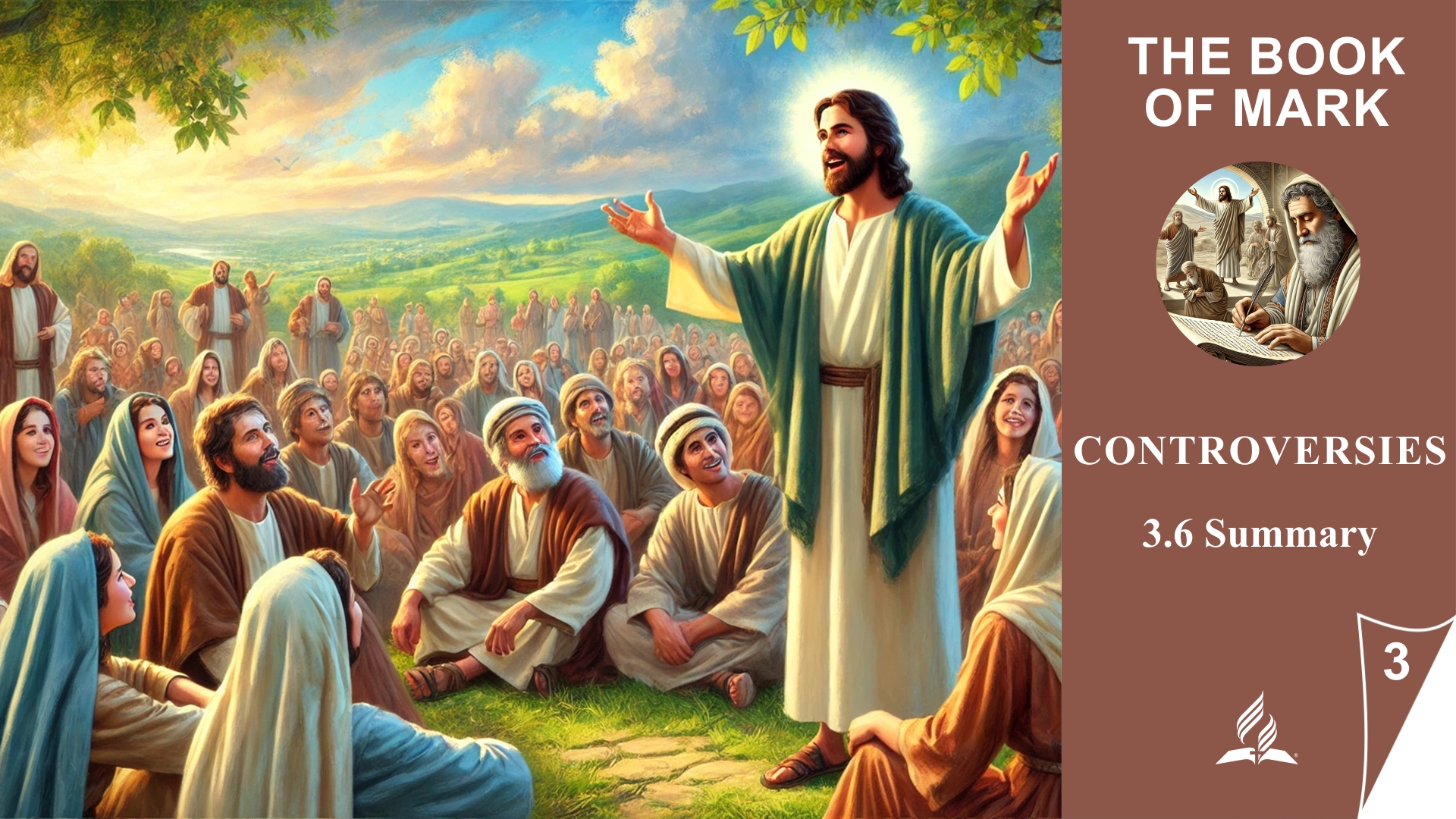


3.6 Summary
Jesus’ Conflicts with the Religious Leaders
Lesson 3 in the Gospel of Mark highlights the various controversies Jesus experienced with the religious leaders and his own family. These controversies reveal deep truths about Jesus’ mission, the nature of faith, and the true meaning of community and obedience to God’s will.
-
Healing of a Paralytic (Mark 2:1-12):
-
Faith and Healing: The friends of the paralytic demonstrate their faith by bringing him to Jesus. Jesus first forgives the man’s sins, leading to a controversy with the scribes who accuse him of blasphemy.
-
Jesus’ Authority: Jesus demonstrates his authority to forgive sins and heal, underscoring his divine mission and power.
-
-
Calling of Levi and the Question of Fasting (Mark 2:13-22):
-
Inclusivity: Jesus calls Levi, a despised tax collector, and eats with sinners, which the religious leaders criticize. Jesus emphasizes that he came to call sinners to repentance.
-
New Understanding of Fasting: Jesus explains that his presence is like a wedding where fasting is inappropriate. He clarifies that his teaching and mission are something new that cannot fit into old structures.
-
-
Lord of the Sabbath (Mark 2:23-28):
-
Sabbath for Man: Jesus defends his disciples picking grain on the Sabbath by explaining that the Sabbath was made for man, not man for the Sabbath. He highlights the priority of human needs over strict rule-following.
-
Jesus’ Authority over the Sabbath: Jesus declares that he is the Lord of the Sabbath, emphasizing his divine authority and understanding of the true purpose of the Sabbath.
-
-
Healing on the Sabbath (Mark 3:1-6):
-
Doing Good on the Sabbath: Jesus heals a man with a withered hand on the Sabbath and questions whether it is lawful to do good or evil on the Sabbath. The religious leaders remain silent and instead plan to kill Jesus.
-
Hypocrisy of the Leaders: The religious leaders reveal their blindness and hypocrisy by condemning Jesus for healing on the Sabbath while plotting to kill him.
-
-
Sandwich Report Parts 1 and 2 (Mark 3:20-35):
-
Misunderstandings and Rejection: Jesus’ family thinks he is out of his mind, and the scribes accuse him of being in league with the devil. These controversies highlight the widespread inability to recognize Jesus’ true mission.
-
Redefinition of Family: Jesus declares that his true family consists of those who do God’s will, emphasizing the priority of spiritual relationships over biological ties.
-
Comfort in Times of Estrangement: The experience of estrangement due to faith is reflected in Jesus’ own experiences, offering comfort and understanding to believers.
-

Connection to Our Daily Lives and Faith:
-
Faith and Action: Faith is demonstrated through bold acts of love and healing. We are called to live out our faith in practical actions and serve others.
-
Flexibility and Compassion: We should be flexible and compassionate in applying religious rules, prioritizing the well-being of people.
-
Spiritual Community: Our true family consists of those who do God’s will with us. In times of rejection, we find support and community in the church and faith communities.
-
Steadfastness in Faith: Despite misunderstandings and rejection, we should remain firm in our faith and focus on God’s will.
These lessons from the controversies in the Gospel of Mark encourage us to live a deep, authentic faith that is reflected in compassion, obedience, and community.

Let us recognize that true community and family arise through shared obedience to God’s will, and strive to live in compassion and spiritual unity.
Visited 55 times, 1 visit(s) today






